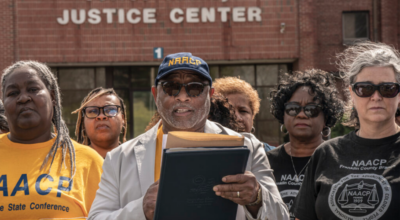
CHATTANOOGA, Tenn., Tuesday, March 22, 2023 – By God’s providence I have been involved in three major court cases that affect the liberty of people in Tennessee. The most significant is pending in federal court in Nashville that involves a 20 percent-plus reduction in Jim Crow race-based police activity in Tennessee.
By David Tulis / NoogaRadio Network
This case is a demand for an injunction against the city of Franklin, whose officer William Orange arrested me without a warrant when he had a duty to obtain a warrant before seizing me covering the Tennessee judicial conference. Of my three unique actions, this is No. 2 in priority.
My biggest public interest lawsuit is behind me. My No. 1 case, State ex rel. David Jonathan Tulis vs. Bill Lee, governor, et al, was in court 878 days in an action which depleted my resources and exhausted my remedies. It gave me real insight into the doings of relativist and essentially privatized civil government. I filed my petition for equity and writ of mandamus Oct. 2, 2020, until Feb. 27, 2023, when Scotus gives a two-word response to my petition for writ of certiorari, “Petition denied.”
The No. 3 action in court is my bid to open the Tennessee judicial conference, where abuses against the people are breathed into existence among the judges and DAs. Chief justice Roger Page maintains an illegal false imprisonment and false arrest policy to keep the conferences secret. They have been closed to the public since they began.
The Tennessee open meetings act generally requires meetings of public agencies to be open to members of the public. Gatherings are not to be secret. “The general assembly hereby declares it to be the policy of this state that the formation of public policy and decisions is public business and shall not be conducted in secret” T.C.A. § 8-44-101 (emphasis added). “All meetings of any governing body are declared to be public meetings open to the public at all times, except as provided by the Constitution of Tennessee” T.C.A. § 8-44-102.
These three cases are all on me, on my expense, in the use of my time – fulfilling my calling before God to serve other people in defense of God-given liberty.
Warrantless abuse = general warrants (forbidden)
The demand for injunction against Franklin is to uphold the Tennessee bill of rights art. 1, sect. 7, and T.C.A. 40-7-103, the exceptions law that lets officers make an arrest without a judge-signed written warrant. Warrantless arrests support the mighty trunk of ultra vires and extralegal enforcement of the motor vehicle code against the entire population, with specific longstanding harms against blacks and poor people. Tennessee courts, obeying policy vs. law, uphold this form of commercial government.
The answer of Franklin to my demand for an injunction is startling. The city says that if it has to get a warrant for most misdemeanor arrests, and obedience to the law, that such demand will be disruptive.
Without any evidence of an unconstitutional policy, Plaintiff asks the court to enjoin a wide array of police activity in the City of Franklin. (See Doc. 31) Even assuming that Plaintiff’s requested injunction is practicable, the imposition of such an injunction would dramatically disrupt – rather than preserve- the status quo by hampering defendant’s ability to respond to and investigate illegal activity, resulting in tremendous hardship to defendants and, in all likelihood, endangering civilians. Without evidence of an unconstitutional policy, this element weighs against the requested injunction.
City of Franklin court filing
These points are an admission of the worst kind. The city admits it routinely hauls people to jail and charges them without judicial approval beforehand. That approval is called a warrant. The city views the “status quo” (illegal) as preferable to obeying the law (legal, lawful).
Efficiency is preferred to the law and the constitution. Many cases prosecuted after an on-spot warrantless arrest are dismissed, meaning that the imprisonment and arrest are illegal from the get-go because no judge reviewed the seizure ahead of time.
The city’s ordinance says cops are supposed to obey the constitution. Here’s the boilerplate:
All arrests made by officers of the Franklin Police Department shall be made in accordance with the Constitution of the State of Tennessee and the Constitution of the United States.
Its ordinance, however, misrepresents the law as saying the officer may arrest a person for an “offense” when it occurs in his presence. The law at T.C,A. 40-7-103 doesn’t say that. It refers to “public offense,” which means an offense that is in the nature of riot, affray or disorder. So, under law, if the offense is not a disturbance of the peace, the cop must get a warrant. He cannot make an arrest if it’s not a “public offense” occurring in his presence.
The city’s argument is an implicit threat to the public. To say compliance with law “endangers civilians” is to threaten the public and to seek support for illegal acts and constitutional violations under warning that without illegal practices, the public is in danger.
Honest government beats ‘efficiency’
No doubt the founders of Tennessee and the drafters of a constitution realized that having a constitution is a hindrance to “law enforcement, which term is used in Franklin’s brief.
Section 7. That the people shall be secure in their persons, houses, papers and possessions, from unreasonable searches and seizures; and that general warrants, whereby an officer may be commanded to search suspected places, without evidence of the fact committed, or to seize any person or persons not named, whose offences are not particularly described and supported by evidence, are dangerous to liberty and ought not be granted.
No doubt the drafters realized that the constitution creates an inefficiency in the operation of the courts and the sheriff’s departments.

Franklin is like every other city and county in Tennessee. Municipalities for years have violated the constitution and T.C.A. 40-7-103. Franklin’s breach of law is like that in Chattanooga, Red Bank, East Ridge, Collegedale, Hamilton County and by troopers and state agents.
Without a warrant ahead of time, the people endure hundreds of arrests every year tossed out as lacking probable cause. These are false imprisonments and false arrests.
I am asking God for his providential care in this matter. As of today, my demand for an immediate hearing remains unheard; I have a call in to the U.S. district court clerk Lynda Hill, urging her to speak with Barbara Holmes, the magistrate in charge of proceedings prior to trial.
Mrs. Hill has just called. She says schedules are in the hands of the judge, with no influence from her as to a hearing date. She also says Magisrate Holmes does not hear petitions for injunction. That is for the chief judge, Waverly Crenshaw.

